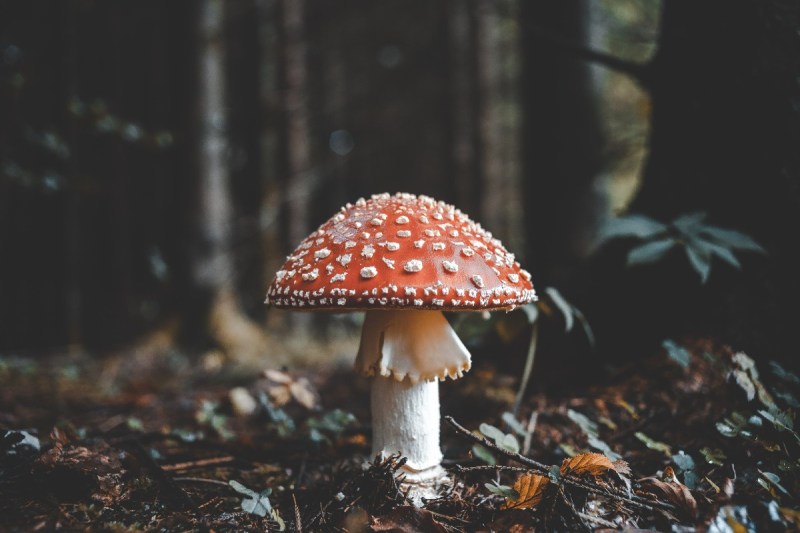It feels like every year there’s a new fad treatment promising to cure your ailments and turn the clock back on the aging process. To the untrained eye, mushrooms, a salad bar staple, might feel like one of those fads. Though mushroom skincare benefits are a relatively new discovery, using wild shrooms as medicine is a tale as old as time. They’ve been a part of alternative medicines since ancient Greece, but can mushrooms really help with your skincare routine? We’ve asked the experts to find out.
History of mushroom medicine
Mushrooms have been used in medicine for thousands of years. The Greek physician and philosopher Hippocrates was first known to classify the amadou mushroom, or “hoof fungus” as we colloquially call it today, as a potent anti-inflammatory aid. Mushrooms were also believed to help heal wounds faster and prevent infection — a historic Neosporin, if you will. They were also commonly used to treat minor ailments like poison ivy and bee stings.
“Mushrooms have long been used as part of traditional medicine and natural remedies, but only recently have they started to gain popularity in the skincare world,” says Dr. Harikiran Chekuri, the medical Head at ClinicSpots.
Thousands of years later, we no longer need to rub mushrooms on our open wounds, but it’s believed that the healing properties of mushrooms that Hippocrates first discovered still hold up in the modern world.
But do they work?
Turns out, scientists today still find anti-inflammatory properties in certain species of mushrooms. It’s not enough to heal any modern-day ailments, but they’re an excellent natural substitution for harsh facial skincare products.
“I believe there are real benefits,” says co-founder of Aion Aesthetics Akis Ntonos, “mushrooms are known to improve the barrier of your skin, help with fading dark spots and keeping your skin hydrated.”
Beyond that, mushroom products boost collagen production, brighten the skin, and reduce inflammation.

Healing properties of mushrooms
So why are mushrooms so good for you — inside and out?
“Mushrooms are rich in fatty acids– which are emollients that help to support the skin barrier to keep the skin well moisturized,” says dermatologist Dr. Hadley King, “they are also rich in vitamins A, C and D and have antioxidant and anti-inflammatory properties.”
Many of the products you’re already using contain the same active vitamins and minerals as mushrooms, but may also be full of harsh chemicals that can further irritate your skin. If you’re consistently breaking out or finding yourself with dry or flaky skin after using facial products, it may to time to make the move over to mushrooms.
“Mushrooms are known to contain powerful antioxidants that can help protect the skin from environmental damage while also fighting signs of aging,” says Dr. Chekuri, “mushroom-based products usually contain ingredients such as hyaluronic acid, which helps keep skin hydrated and youthful-looking.”
Mushroom face products — particularly those containing hyaluronic acid — are a great companion to retinol-based products as well.
How to utilize mushrooms for skincare
Luckily, you have your run of the gambit when it comes to mushroom brands and how to incorporate them into your skincare routine.
“Mushrooms can be used in skincare in a variety of ways,” says dermatologist Asmi Sanghvi at Mount Sinai Health System, “including as a topical ingredient in creams, serums, and masks, or as an oral supplement.”
Consistency is key, so find the method that works best for your schedule and routine. Maybe that means taking a daily vitamin, if that’s easier to remember. For more topical usage, you may opt for a cream or a weekly serum. Before choosing your go-to product, take a look at the ingredients on the label.
“It’s important to look for high-quality, natural ingredients when choosing mushroom skincare products,” says Dr. Chekuri.

Who should try mushrooms?
It can be frustrating for people with sensitive skin to find a product that works for them. If this sounds like you, mushrooms may do the trick.
“Mushroom skincare is mild enough for all skin types,” Ntonos tells us, “it was considerably safer than many other skincare products because it was also devoid of harsh chemicals and parabens.”
Though it tends to be safer, it’s still important to start slow when using a new product. Try a smaller amount than recommended on the bottle for the first few applications.
“It’s best to patch test any new product before using them all over your face – this way you can make sure you don’t have an adverse reaction,” says Dr. Chekuri.
Types of mushrooms for skincare
Most mushroom brands will contain a selection of the following species, which have different healing properties for your skin and your body.
Chaga mushrooms are parasitic fungi that latch onto birch trees. They look like charcoal, definitely unappetizing, but when used correctly they can help protect the skin from environmental stressors like air pollution. They’re also high in antioxidants and reduce inflammation.
“Also known as the ‘mushroom of immortality,’ reishi has been used for centuries in traditional Chinese medicine for its immune-boosting properties,” Sanghvi says, “In skincare, it is valued for its anti-inflammatory and antioxidant properties, which can help to soothe and protect the skin.”
Cordyceps and lion’s mane mushrooms both have adaptogenic properties, meaning the can help reduce stress and boost your energy levels when taken orally. These are most commonly found in supplements, along with other natural ingredients. They both improve skin texture, while helping maintain elasticity and firmness.
Editors' Recommendations
- Skin flooding is the newest TikTok skincare trend, but is it legit?
- The ultimate guide for men’s skincare in the fall that everyone should follow
- An expert reveals the 5 best men’s skincare tips for National Men’s Grooming Day
- This hot new skincare brand for men was designed with health (and beauty) in mind
- How to make a good first impression (It’s about more than just your look)





